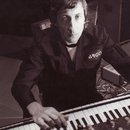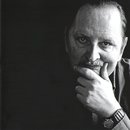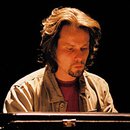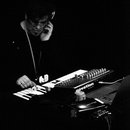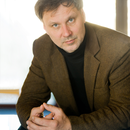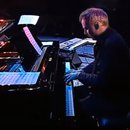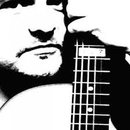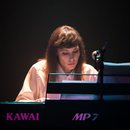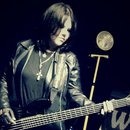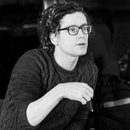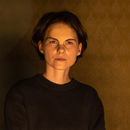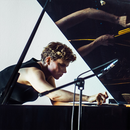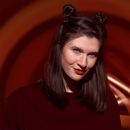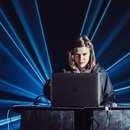This playlist is inspired by Linas Paulauskis’ article ‘Many Musics,’ which was published in the magazine Lithuanian Music Link in 2018. It discusses the growing tendency of classically trained Lithuanian composers who have already acquired or are about to acquire education in music composition to dabble in genres outside their academic interests such as rock, heavy metal, jazz, free improvisation, electronic club music, alternative pop, fusion, world and others.
Many chameleon-composers in Lithuania keep successfully changing their musical “skin” in their creative work, including Teisutis Makačinas, Laimis Vilkončius, Raimonda Žiūkaitė or Gabrielius Vagelis. Still more composers episodically try to release the bolts that tightly restrain their alternate selves. In previous decades, such endeavours were undertaken by Feliksas Bajoras and Mindaugas Urbaitis, more recently that has been done by Egidija Medekšaitė or Dominykas Digimas. Other spheres in which academic composers’ alter egos flourish are theatre, cinema and interdisciplinary projects. Jonas Jurkūnas, Martynas Bialobžeskis and Faustas Latėnas are actively expressing themselves in these territories.
However, the composers’ alter ego playlist only features work by those who perform their music in alternative genres themselves at present, except for the necessary historical excursuses. Even after narrowing down the search with this requirement, it is hardly possible to keep up with every active composer because the music scene is very dynamic, promising new names keep appearing again and again. The playlist therefore aims to highlight the trend rather than provide a definite list of names.
There are some authors whose entire oeuvre can be more easily comprehended as a whole. In the case of Algirdas Klova (1958-2021) it is the leitmotif of folk music which brings together his work and stage performances. Playing the violin, being the leader of the authentic folk music group Vydraga, performing country, bluegrass, world music, working on folk-jazz projects, he carried folk music motifs and moods over into his pop songs as well as into academic compositions, and most probably precisely because of that, the flow of those pieces is so natural and, seemingly, in alignment with the living nature.
It’s not always so simple to understand the work of other authors as one picture. And it’s worthwhile here to make a detour to the past and remember several composers, today no longer present live on the stage of non-academic music, but who have left a marked imprint. We should begin with the composer, keyboardist, carillon player Giedrius Kuprevičius (b. 1944). He is a composer of some especially popular musicals in Lithuania, as well as operas, a lot of orchestral, chamber and vocal music, at the turn of the century he played in the world music trio Žaliakalnio vilkai (The Wolves of Žaliakalnis), presented programs of solo improvizations, but what he is most remembered for is the group Argo, which he founded at the end of the 1970s and led for a decade. It was called one of the first electronic music groups in the Soviet Union (the members were Giedrius Kuprevičius – keyboards, Julius Vilnonis – keyboards, Linas Pečiūra – guitar, Arūras Kuznecovas – bass, Arūnas Mikuckis – drums). In those times there was no possibility of easily getting the instruments necessary for this kind of music and so the members of the band began constructing synthesizers themselves. Today we would regard the music they played as progressive rock with inserts of fusion jazz, disco and ambient. Whatever the case, that music, mostly composed by Kuprevičius, the leader, was an example for young musicians of what could be done, music that was eagerly awaited and bought by listeners throughout the Soviet Union at the time. Even though officially Argo’s music was viewed with some suspicion, their debut record Diskofonija (1980) went through many print runs; it’s now thought that in total about one million copies of this record were printed. A Lithuanian platinum record heard the length and breadth of the Soviet Union.
Vaclovas Augustinas (b. 1959), the recipient of Lithuania’s highest artistic award the National Prize for Culture and Arts, leader of the Vilnius municipal choir Jauna Muzika, a composer of mainly choral music, wrote for and played keyboards in the progressive rock band Saulės laikrodis (Sun Clock), the activities of which were practically prohibited and stopped by the Soviet authorities, accusing their music of ‘nihilism’, ‘pessimism’ and ‘subjectivism’. In 1987 Augustinas joined the political punk/post-punk group Antis (later their style extended to progressive rock, vaudeville, and finally to industrial rock). Antis was the real symbol of Gorbachev’s perestroika and later of the process of reclaiming Lithuania’s freedom. And two decades later the band’s founder and ideological leader Algirdas Kaušpėdas appointed Vaclovas Augustinas as the group’s music director.
Another composer (who is now seldom playing live on stage), Linas Rimša (b. 1969) is probably the one who can turn his hand to more things than anyone else mentioned here: besides academic music, he wrote and played jazz (on keyboards and the harmonica), world music, produced pop music albums, was the first to play acid jazz in Lithuania, worked on crossover projects, in which he brought together electronic dance music, world music, hiphop, jazz, popular opera repertoire and the centuries-old tradition of Lithuanian polyphonic songs (Lith. sutartinės). ‘I’m always entranced and reach a certain feeling of ecstasy when successful in finding commonalities, to hear the coming together of many different elements,’ said the composer, explaining his inclinations. ‘All the effort, which requires the search for the one and only ‘key’, are justified by an unexpected coherence, the paradoxical feeling that I didn’t create those commonalities – they are there of their own accord.’
At the beginning of his creative career Antanas Jasenka’s (b. 1965) style spectrum was particularly contradictory: chamber instrumental and vocal pieces full of oriental inspirations, but expressed quite abstractly, and, in a move radical for the time, experimental electronic music and harsh noise. His later academic work leaned towards neo-romantic sound, while electronic music came closer to ambient, post-techno and IDM styles.
After several years of performing jazz, the pianist Tomas Kutavičius (b. 1964) decided to turn to academic composing and earn a diploma in music composition. He mostly played free jazz, although the echoes of ‘pagan rituals’ by his father, composer Bronius Kutavičius were quite influential in this field. His current chamber and orchestral opuses are built on rational sound constructions and his recent work, in particular, liberates a motoric rock energy that is rarely seen in the Lithuanian academic music.
The composer, lyricist, guitarist, keyboard player Marius Salynas (b. 1975) says that the phenomenon of the popularity of music could be a separate field of study. He began by studying violin and double bass in music school, whereas in his teenage years he played, for example, punk rock and grunge – at the time that kind of music was the most popular, now it has become niche. It would seem that now, having switched from electric to acoustic guitar, he’s more attracted to calm, sometimes meditative or repetitive sound material, let’s say in accompanying singing actors. Very clearly feeling his creative dualism and even eclecticism, from his young days he has been active in various genres and has no intention of stopping. And even though these sides of his creative work are intended for different audiences since it’s musics of different materials and geneses – they still influence one another: more interesting angles and sound structures are to be found in his music of more popular genres while his academic works are sometimes not that academic, suffused as it is with the vitality of other styles.
In her academic creative work Božena Čiurlionienė (b. 1988) often recreates the forms and sounds of early music, music from the middle ages to the baroque. And that’s completely in keeping with what she as a keyboard player, singer and composer does in the group The Skys that plays classical/progressive rock (I didn’t manage to get to the bottom of what’s behind the spelling of the name). The group can boast of the fact that it’s the Lithuanian band that has performed most widely throughout the world, sharing the stage with giants of progressive rock like Rick Wakeman, and has also garnered the most awards abroad – nine in Poland and five across the Atlantic. This composer’s areas of activities are constantly undergoing dynamic change: one day she’s writing a thesis about the change in the understanding of the tritone interval and the symmetrical series in 20th century music or organizing an international conference on philosophy and art theory, and on another day – recording a new rock song with India Carney, the semi-finalist of the Voice of America.
The composer, singer, lyricist, keyboardist, sound director, event organizer, music manager, and educator Ieva Baranauskaitė (b. 1989) can turn her hand to more things than anyone else because she has a greatest bunch of different collectives at a time: Esi (in her own words, jazz, improvisation, contemporary, free, philosophy, avant-garde, silence, poetry), Jazz by Two (jazz, blues, improvisation, pop), In Albedo (jazz, triphop, reggae, drum’n’bass, psychedelic, dub, world, free, fusion, progressive), Such’a’Trip (pop, blues, world, rock, jazz) – those are just the groups of which she’s a leader at present – there were many more. Narratives of old myths, alchemical transformations, the attitudes of human beings in the eternal confrontation of the good and the evil can be found throughout all of her creative work, from the musical, theatrical and interdisciplinary projects, from the above-mentioned groups to her symphonic Master’s work Bazm-e dāstāngo (2016), presenting reflections of the tradition of gatherings of Pakistani story-tellers and writers.
Beata Juchniewicz (b. 1998), who sings and plays guitar and keyboards in the metal group Deliriance, has loved classical music from her childhood days and now feels that both sides of her creative work are very much connected and help one another. She says that generally speaking the whole divide between ‘serious’ and ‘popular’ music most probably arose because of the influence of the music industry on the way music is distributed. Her love for classical music came first, she was 14 when she wrote her first Sonatina for piano and 15 when she began to take an interest in rock. She now weaves in motifs from songs played by her band into her choral and chamber music so that some of her metal songs can help us understand some of the moods and meanings of her academic compositions. And vice versa. Having chosen the subgenre of gothic/symphonic metal (which, as she emphasizes, is the closest to classical music), she says that in her academic creative work she is a complete chameleon: her tastes and the influences on her music fluctuated from Frédéric Chopin (in her teenage years she was a complete romantic, and even later her fellow students saw her as a representative romantic composer first and foremost and were very surprised to find out about her other side) to Messiaen or her recently beloved György Ligeti. She is now seeking to combine a sonoristic and neoromantic sound, still using Messiaen’s system of modes, in the search for new instrumental colours. And on the side of non-academic music, recently she also started Lelia, a solo project of dark dream pop. Anyway, all of her creative work is united by this gothic thing: dark shades of colours, a melancholy atmosphere, themes of death and horror, sombre grotesques. And there’s nothing surprising here – after all, all that gothic sensibility, all the extremes of rock and metal in principle are ‘metastases’ of the same romanticism stretching out over time.
Andrius Šiurys’s (b. 1991) acquaintanceship with composition didn’t begin with his academic studies but with electronic music. He began to write academic music only after beginning his Master’s studies at the Lithuanian Academy of Music and Theatre in 2013. Before that he didn’t know very much about that sort of music and felt himself to be an outsider because of his lack of knowledge; on the other hand, he really didn’t like the music he’d heard by Lithuanian composers at concerts and in exams, and that provided the greatest impetus for him to create his own music. At the time, he had a lot of creative anger and wrote very expressive and technical music. He now says that perhaps his music has slowed down and become more ‘serious’ – but he feels that he may perhaps go back to his earlier, more authentic self. What is the connection of his academic creative work with the music played by his groups – Delasferos (vocal chill out, ambient, triphop), the Electronic Music Trio with the composers Jonas Jurkūnas and Martynas Bialobžeskis (noise, industrial, glitch) and Galvos oda (Head’s Skin; ‘an absurd noise’)? His listeners, acquainted with all the different areas he’s involved in, say that they share an oddness, a strange darkness and bitterness. Not specially aiming for this, he himself feels the divides and the inevitable overlaps; the tools of various genres are used in his music for the theatre and in some chamber electroacoustic compositions – but it’s precisely in his academic notated music that he allows himself to experiment the most. And what about Head’s Skin then? Well, he himself finds it strange when anyone tries to figure it out, few people like it and they find it difficult to comprehend how a ‘serious’ composer can write something so absurd…
Ensconced in more peripheral territory of non-academic creativity is the composer, improviser, sound and video artist Gailė Griciūtė (b. 1985). The processes involved in her composing were radically influenced by discoveries made while improvising; improvisational-aleatoric episodes in her written music help her to elicit an organic flow. At the same time, the improvisational sphere of her work is as heavily influenced by composition – these various constructional solutions in an improvisational context, an exceptional feel for the whole form. You might ask what’s so special about a composer that improvises? Well, there are her chamber compositions woven from ascetic strokes and silences. And there are her fierce improvisational volcanoes on piano (usually heavily prepared) – paradoxically, no matter how much she tries to rein in her emotions and leave as few sounds as possible! – since a lot depends also on the energy of other improvisers making music together with her (like the electronic musician Antanas Dombrovskij, the drummer Arnas Mikalkėnas, Yumiko Yoshimoto, a guitarist from Japan, or the Lithuanian Art Orchestra led by Vladimir Tarasov). If you listen to her different kinds of music without knowing whose they were you wouldn’t be able to tell that they belonged to the same person. Listening for a second time more intently, you would recognize some common features – sounds, details and shapes. And once you were in possession of all the facts, you might perhaps think that it was a perfect reflection of yin and yang in the music of one and the same person.
But let’s return to the more ‘mainstream’ spheres of non-academic music. In this regard, the best known of those who can turn their hand to many things today in Lithuania is Bjelle (b. 1991), whose real name is Raminta Naujanytė. She is a composer, singer, lyricist, guitarist, keyboardist, educator, event, radio and TV presenter, piano tuner, painter… in other words, a Renaissance person. Constantly experimenting, changing both the style of the music Raminta Naujanytė-Bjelle writes and her voice, as well as her stage image, Bjelle began writing songs when she was 6 and by the age of 9 she was convinced that one day she would be an academic composer. In her teenage years she was active on the rock scene in her native town of Ukmergė, later she performed what was called ‘sung poetry’ in Lithuania and Eastern Europe, ‘bard songs’ in Russia, and simply folk in America (she hasn’t given up this type of music to this day). At that time, she wrote a patriotic song about a brother riding off to war which became one of those songs that all of Lithuania knows. Her debut album in 2017 Kas tu toks (Who Are You) was already an example of refined art pop.
In fact, in her case it’s again hard to believe that everything is composed by just one person. Although one could find some connections between the three a capella songs from the above-mentioned album and her compositions for choir of which she has written over a dozen. In both her vocal and instrumental music, she pays a lot of attention to the sonoristic principles of compositions, to the psychoacoustic analysis of melodies. In the meanwhile, her identity in her other area of creative work, even though forever changing, remains recognizable – perhaps similar to the constant experimentation of great songwriters like Joni Mitchell, Kate Bush or Esperanza Spalding who change and yet remain the same. But here comes the latest news: Bjelle disbands her rock group, Bjelleband, decides to perform solo from now on – and goes to Reykjavik to study electronic music and sound technology at the Icelandic University of the Arts. We will wait – those studies, as well as the experience of Iceland itself, will infuse her music with yet more colours and meanings.
In 2017 the newest firework to light up the sky was Monika Zenkevičiūtė (b. 1995), who began playing electronic music under the stage name of Monikaze while studying composition. She began – and immediately went off to Bristol to play in the cradle of triphop to show how it should be done today. She wasn’t striving to follow some specific electronic music subgenre, even though, of course, she didn’t invent everything from scratch. It all began with the intention of having some fun and testing her abilities – taking on sound models of many styles, combining them in various ways and clearly adapting some principles and skills of development and alternation of structures from the acacademic composition. The rhythms of IDM or triphop, ethereal ambient sounds, her own vocalizing (listen, say internet commentators, to how that birdie sings on top of bass) are arranged into such focused and meticulously detailed ‘orchestrated’ forms that there’s nothing to compare it to – it would seem that there’s no one else playing this kind of electronic music. Let’s simply say that this is a case of mathematics meeting romanticism: there are always the through-composed forms, electronic tone poems, details ‘sticking into acupuncture points’, and pulsations flying farther off into the distances.

